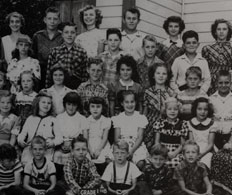
|
The 1.5 acre site along Llagas Creek was donated by Bernard S Machado on June
5th 1895 for a one-room school. Charles and Leon Smith completed
construction that Summer and classes began in the Fall of
1895. In 1910 a second room was added on the Llagas Creek
side to accommodate all 8 grades.
Bernard Machado named his son James F. Machado, William Britton
and James P. Ward as trustees who all wanted a neighborhood
school for the children of Paradise Valley. Annie Britton,
the daughter of John Britton, was the first teacher. Erna
Purcell was the first student to graduate from the eighth
grade.
The two-room school was used continuously until May 18th,
1967 when engineers determined that the building did not meet
State earthquake standards. A portable building was moved
on to the site behind the old school and it was used for first,
second and third grades from the Fall of 1967 until January
2003 when a well failed.
The old school building was abandoned by the school district
for classes after May of 1967 and was used as a storage site
for books and other materials. By 1974 the old school was
in a sad state of disrepair. Local citizens interested in
preserving the original school formed the Machado School Heritage
Society. It was restored under their auspices and was dedicated
as a historical site on May 21, 1983. Since that tine the
old school has become a popular community center used for
family reunions, birthday parties, yoga classes, weddings
and other family and community gatherings.
Though formal classes are no longer held there, the old school
still echoes with the sound of children for The Machado
School Field Trip Program which brings many local
classes out for a day of fun and hands-on learning.
Grades K-3 participate in the School Days Adventure Program
which is a combined science, history and art program. Activities
at stations are based on grade level. They may include a sketch
of the old building, a nature scavenger hunt, old fashioned
games and imaginative play, local history, and/or folk dancing.
Each grade level does different activities.
Grades 4 and 5 have history programs tailored to their grade
level. The Grade 4 Gold Rush Program is an 1849 experience
of life in the mining camps: students pan for gold, make camp
by setting up a tent, enjoy the accommodation of the Hotel
El Dorado, experience law and order in the wild west and send
letters home. Pioneer Days is another Grade 4 program with
focus on the westward movement and local pioneers. Grade 5
is focused on Colonial times. Shortly after arrival, the boys
and girls make tricorns and mobcap hats then immerse themselves
in Colonial activities. Colonial school lessons include ciphering,
recitation, and penmanship with a quill pen. At the other
stations, students learn about typical children’s activities
during colonial times such as candle-making and cornhusk doll
making.
|
